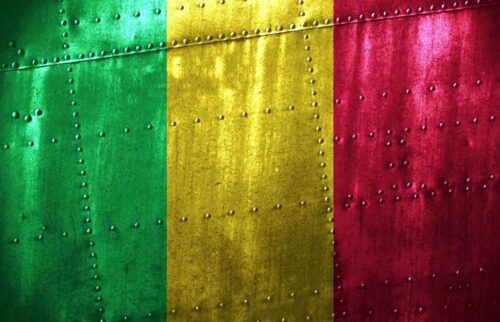Mali “A coup within a coup” in an increasingly fragile country.
The 24 May coup against an attempt to reduce the influence of the military has increasee tensions between the authorities and their main supporter in the war against the jihadists that could be lost since France and its Sahelian allies do not appear to share any longer the same strategy. Meanwhile, the jihadists are making progress.
On the last 24 May, a communiqué announced the dissolution of the government on the national TV and a government reshuffle. Two or the five colonels of the ruling junta formed after the 18 August 2020 coup which overthrew the civilian President Ibrahim Boubacar Keita (IBK), accused of corruption, the Defence Minister Sadio Camara and the Minister of Security, Modibo Kane, were sacked by the transition President, the 70 years old retired colonel, Bah N’Daw. The latter was seeking to reduce the influence of the military in the interim government, following popular protests and strikes against the growing militarization of the institutions and also against their lack of efficiency.
However, the reshuffle prompted a third officer, Colonel Assimi Goïta, the commander of the special forces and the Vice-President of the transition government, who is considered as the master mind of the August coup, to stage what has been dubbed in Bamako as “a coup within the coup”. A few hours after the broadcast of the communiqué announcing the government reshuffle, Goïta retaliated with another communiqué which stated that he had been forced to act in order to “rectify the transition”. Later on, he told religious leaders in Bamako that Bah N’Daw’s decision had been a dangerous one since he had excluded from the government, two commanders of the national guard and therefore was threatening to create divisions within the army in a situation which is already very fragile, in front of the jihadist military expansion. On the same day, the transition President and Prime Minister were arrested at their homes and brought to the Kati military camp, at 15 km from Bamako and forced to resign. Four days later, on the 28 May, Goïta was proclaimed by the Constitutional Court.
The 30 May, in an interview published by the Paris-based weekly Journal du dimanche (JDD), the French President, Emmanuel Macron disapproved the coup and threatened to pull out the 5,100 troops of the French anti-jihadist “Barkhane” operation in Sahel, Macron wanted to show his irritation in front of alleged plans by the authors of the coup to strike a deal with the Al Qaida and Islamic State related groups, which would have undermined seriously the Barkhane operation. Macron’s narrative is that there is no point for France fighting the jihadists if the Malian authorities (like those of Burkina-Faso) are simultaneously holding openly talks with the enemy and giving him a kind of political recognition and credibility. This is particularly the case of the authors of the 24 May coup who consider the Great Imam of Bamako, Mahmoud Dicko, as their spiritual guide. It is an open secret that negotiations between the authorities and the jihadists have the imam’s blessing. Yet, this trend is not a new one. Before IBK was overthrown last August, such negotiations had started.
In the event of such deal, the continuation of Barkhane would become meaningless, considers the French establishment. “We do not have a vocation to stay there forever”, told Macron to the French paper.
Another source of irritation for Paris, is the new Malian President’s decision to appoint as Prime Minister, Chogué Maïga, a former minister considered as pro-Russian.
Macron’s warning was aiming at putting pressure on the regional leaders of the Economic Community of West-African States (ECOWAS) who met on the 31 May in a special summit to find a common response against the authors of the coup, with the hope they could persuade them to come back to the constitutional order.
But off the record, French analysts doubt that the threat of a withdrawal of French troops will materialize in the near future.
Three days after Colonel Goita was sworn in as Mali’s transitional president on the 7 June, Macron announced during a press conference that France’s Barkhane counter-terrorism operation would come to an end and be merged into a broader international mission. Accordingly, the details of such withdrawal should be finalized by the end of June after consultations with African and European partners.
Yet, the withdrawal will not be immediate and would even take years. Half of the 5,100 troops of Barkhane should be pulled out during the first quarter of 2023. The plan is to keep later a reduced number of special forces of some hundred troops and provide support to the armies of the G5 member states, alongside with European partners, within the European “Takuba” operation. The problem however is that France’s EU partners are not very enthusiastic about participating to it.
The problem is that the mission is challenging. Macron says that France cannot go on working with governments in the Sahel who negotiate with Islamist militants. At the same time, France suspended its joint military operations with Malian forces. Finally, eight years after its launch in 2013, Operation Barkhane has not been a success. It has not been able to stop the jihadist expansion in Mali, Burkina Faso and Niger.
At least 50 French troops died in combat, over 8,000 Africans mainly civilians have been killed, about two million people have been displaced, stress French media.
Meanwhile, at the regional level, the reaction is cautious. The Accra summit of the 31 May called for a return to the constitutional order and suspended Mali from participating to the ECOWAS institutions. The ECOWAS called for the creation of an inclusive government with a much strong civilian component. One of the consequences is that Mali will not access anymore to certain loans but altogether ECOWAS did not adopt a package of severe sanctions like in 2012, when it decided to close the borders with Mali and applied economic sanctions. Altogether, considers the political scientist Niagale Bagayoko, one can consider that the package or regional sanctions is a “minimalist” one. On the 3 June, the African Union also announced Mali’s suspension. But critics find this kind of measure as a toothless one.
At the same time, observers point out that the 24 May coup was received with much indifference in the streets of Bamako. Such apathy or fear from repression by the military does not give much incentive to fellow African leaders to be more “papists than the pope”.
In fact, the only demonstration which was reported was one of the military junta supporters with some of them, waving Russian flags.
The problem with adopting sanctions against Bamako’s new military regime is that they might further weaken the already fragile Malian army, which despite, the French and UN presence, has lost a lot of ground to the jihadists. In the centre of Mali, around the city of Mopti, the jihadists are now controlling the countryside, with the fighters of the Fulani preacher, Amadou Kouffa’s Macina “Katiba” (brigade) striking deals with the village chiefs of the Niger Delta and even of the Dogon mountains. For years now, the jihadist presence is no longer restricted to the Tuaregs’ Northern area but has expanded deep to the South.
Less than a week after the coup, the Malian army showed again its tremendous vulnerability, when a group of jihadists attacked a road checkpoint in the South of the country, at Bougouni, on the strategic road between Bamako and the border of Cote d’Ivoire, killing one policeman and four civilians. This is the first time, the jihadist carried out an attack in this area, which had been considered as safe until then.
United States already cut their military support to the Malian army. It is likely that the coup may deter other European states to get more involved in the “Takuba” mission of training and advisory to the Malian combat troops. An additional problem is that the authors of the coup claim say that the implementation of the 18 months roadmap of the transition and the return to constitutional normality which includes free and fair elections, will be delayed, which causes irritation among Mali’s international partners. But attempts to strangulate or coerce the ruling military risk to undermine them at the very moment they face enormous difficulties against an enemy who knows the fields and operates in mobile motorbike units, like a sort of modern cavalry and is increasingly ruling large areas of the country, imposing the sharia law.
François Misser









